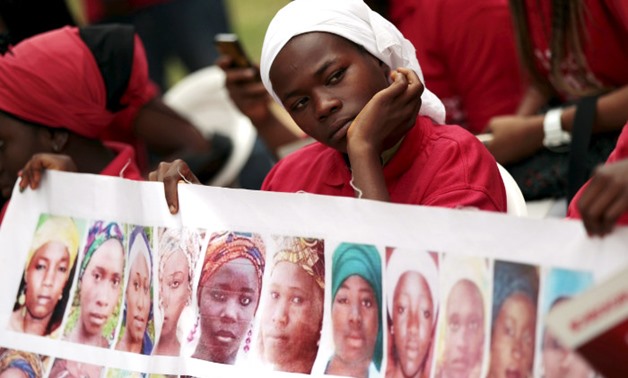
Bring Back Our Girls (BBOG) campaigners look on during a protest procession marking the 500th day since the abduction of girls in Chibok, along a road in Abuja on 27 August 2015. REUTERS/Afolabi Sotunde
NIGERIA - 21 March 2018: Boko Haram Islamists who kidnapped more than 100 schoolgirls in Dapchi, northeast Nigeria, just over a month ago have returned the students to the town, two parents told AFP on Wednesday.
A senior government source in Abuja and police in Yobe state also confirmed the girls' return although it was not immediately clear how many of the 110 students had been freed.
The Dapchi kidnapping on February 19 brought back painful memories of a similar abduction in Chibok in April 2014, when more than 200 girls were taken.
Bashir Manzo, who heads a parents' support group in Dapchi, said: "The girls have been brought back. They were brought in nine vehicles and dropped outside the school at about 8:00 am (0700 GMT).
"I have the list of the missing girls with me, so I am now heading to the school to take a roll call of the returned girls to determine if any of them is still missing.
"These girls were not accompanied by any security personnel. Their abductors brought them, dropped them outside the school and left, without talking to anyone.
"We will get to know more details from the girls about their predicament while in captivity."
Alhaji Deri, whose daughter was among those kidnapped, supported Manzo's account in a separate phone call, adding: "We are here in the school with the girls."
A senior government source in Abuja confirmed the release but said officials were still trying to verify how many girls had been freed.
Nigeria's President Muhammadu Buhari said last week said the government had "chosen negotiation" to secure the return of the Dapchi girls rather than use military force.
"We are trying to be careful. It is better to get our daughters back alive," he said.
Boko Haram has used kidnapping as a weapon of war during its nearly nine-year insurgency which has claimed at least 20,000 lives and made more than two million others homeless.
The Islamic State (IS) group affiliate has not claimed responsibility for the abduction but it is understood that a faction headed by Abu Mus'ab al-Barnawi was behind it.
In August 2015, IS publicly backed Barnawi as leader of Boko Haram, or Islamic State West Africa Province, over Abubakar Shekau, whose supporters carried out the Chibok abduction.
Analysts have attributed a financial motive to the Dapchi kidnapping given government ransom payments made to Boko Haram to secure the release of some of the captives from Chibok.
Questions are likely to be raised about the circumstances of the release, particularly if Boko Haram fighters were able to travel in to and out of Dapchi unchallenged.
Yan St-Pierre, a counter-terrorism specialist with the Modern Security Consulting Group in Berlin, said the Dapchi girls' release was not without precedent.
Earlier this year, a number of hostages, including university lecturers, were freed.
But he said the latest release was "casual enough to raise a lot of questions, especially about the payment".
"If they did pay, the Nigerian government likely paid a premium to accelerate the release in order to avoid another Chibok," he added.


Comments
Leave a Comment